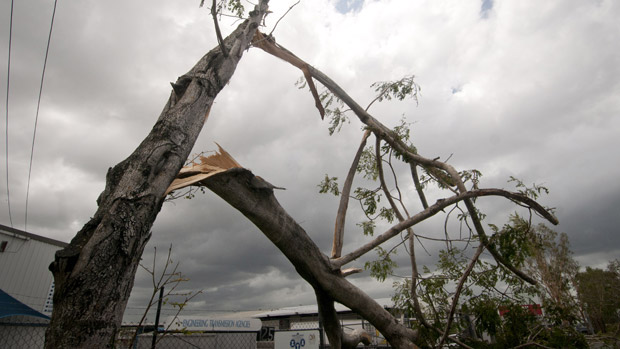'Supercell' storm bombards Brisbane with giant hailstones
Strong winds and lethal balls of ice caused £50m of damage in the Australian city of Brisbane

A free daily email with the biggest news stories of the day – and the best features from TheWeek.com
You are now subscribed
Your newsletter sign-up was successful
A clean-up operation is under way after a "supercell storm" swept through southeast Queensland, raining hailstones the size of tennis balls rained down on Brisbane and the surrounding area.
In what the BBC describes as the area's worst storm for 30 years, up to 90,000 homes were left without power after winds gusting at 85mph ripped down trees and power lines.
Buildings and streets were flooded, and commuters were left stranded after rail services were suspended across the city. Light planes were flipped upside down on an airfield.
The Week
Escape your echo chamber. Get the facts behind the news, plus analysis from multiple perspectives.

Sign up for The Week's Free Newsletters
From our morning news briefing to a weekly Good News Newsletter, get the best of The Week delivered directly to your inbox.
From our morning news briefing to a weekly Good News Newsletter, get the best of The Week delivered directly to your inbox.
"It looks like the apocalypse," said one resident.
Sky News says 39 people were injured in the storm, which was as strong as a Category Two cyclone. There are no reports of fatalities.
The army has been called in to help emergency crews clear up the storm wreckage, estimated to have caused 100m Australian dollars (about £54m) worth of damage. Insurers say the episode will be a "catastrophe" for them, The Guardian reports.
Meteorologists are describing the incident as a "supercell" storm - which occurs when an ordinary storm cell encounters damp air from sea breezes. It produces a vortex, with the air spinning at high speed as it rises through the atmosphere.
A free daily email with the biggest news stories of the day – and the best features from TheWeek.com
The Queensland premier, Campbell Newman, told ABC radio the storm was "probably the worst to hit the city as a whole since 1985".
-
 The ‘ravenous’ demand for Cornish minerals
The ‘ravenous’ demand for Cornish mineralsUnder the Radar Growing need for critical minerals to power tech has intensified ‘appetite’ for lithium, which could be a ‘huge boon’ for local economy
-
 Why are election experts taking Trump’s midterm threats seriously?
Why are election experts taking Trump’s midterm threats seriously?IN THE SPOTLIGHT As the president muses about polling place deployments and a centralized electoral system aimed at one-party control, lawmakers are taking this administration at its word
-
 ‘Restaurateurs have become millionaires’
‘Restaurateurs have become millionaires’Instant Opinion Opinion, comment and editorials of the day
-
 Epstein files topple law CEO, roil UK government
Epstein files topple law CEO, roil UK governmentSpeed Read Peter Mandelson, Britain’s former ambassador to the US, is caught up in the scandal
-
 Iran and US prepare to meet after skirmishes
Iran and US prepare to meet after skirmishesSpeed Read The incident comes amid heightened tensions in the Middle East
-
 Israel retrieves final hostage’s body from Gaza
Israel retrieves final hostage’s body from GazaSpeed Read The 24-year-old police officer was killed during the initial Hamas attack
-
 China’s Xi targets top general in growing purge
China’s Xi targets top general in growing purgeSpeed Read Zhang Youxia is being investigated over ‘grave violations’ of the law
-
 Panama and Canada are negotiating over a crucial copper mine
Panama and Canada are negotiating over a crucial copper mineIn the Spotlight Panama is set to make a final decision on the mine this summer
-
 Why Greenland’s natural resources are nearly impossible to mine
Why Greenland’s natural resources are nearly impossible to mineThe Explainer The country’s natural landscape makes the task extremely difficult
-
 Iran cuts internet as protests escalate
Iran cuts internet as protests escalateSpeed Reada Government buildings across the country have been set on fire
-
 US nabs ‘shadow’ tanker claimed by Russia
US nabs ‘shadow’ tanker claimed by RussiaSpeed Read The ship was one of two vessels seized by the US military